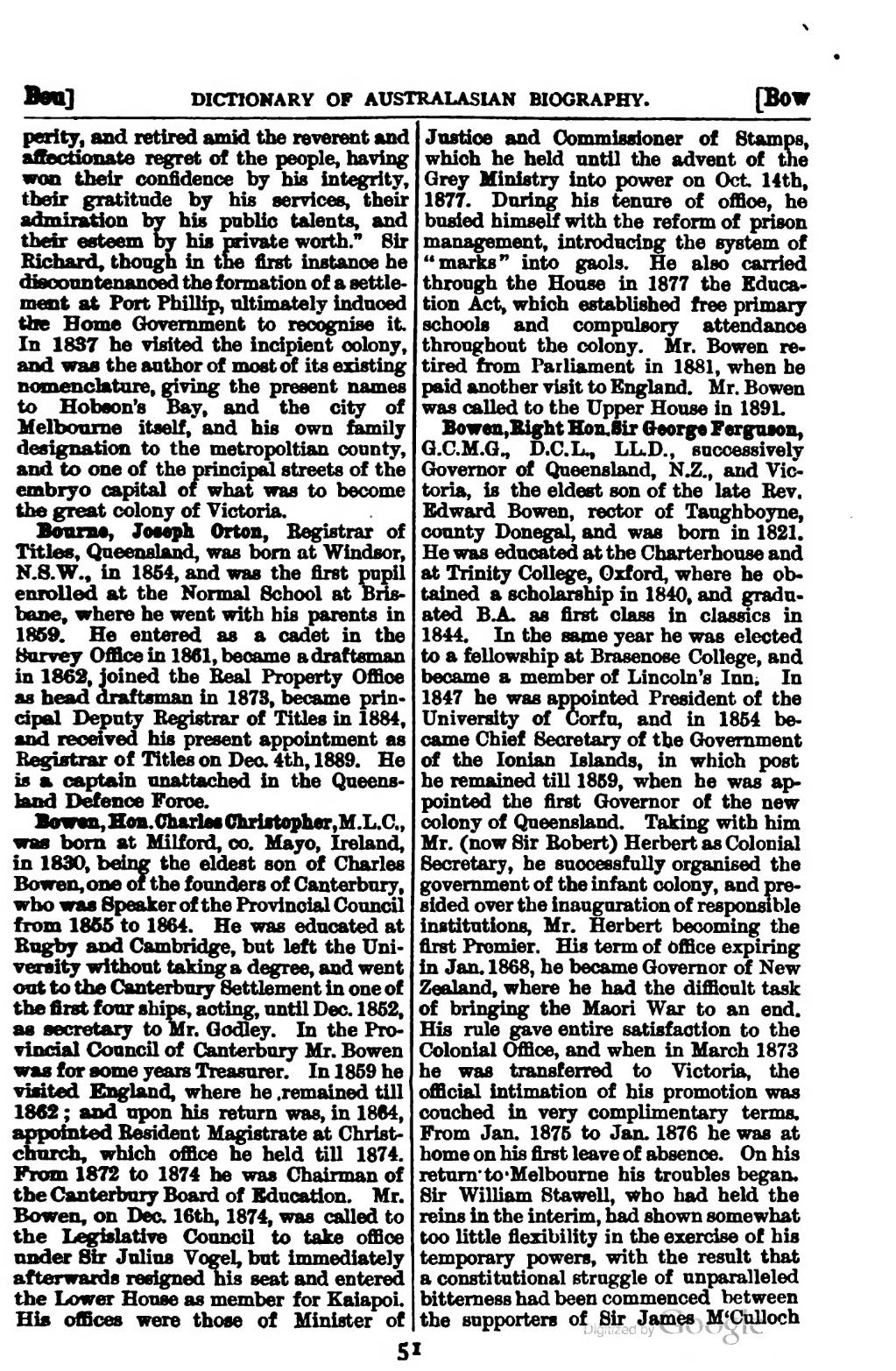perity, and retired amid the reverent and affectionate regret of the people, having won their confidence by his integrity, their gratitude by his services, their admiration by his public talents, and their esteem by his private worth." Sir Richard, though in the first instance he discountenanced the formation of a settlement at Port Phillip, ultimately induced the Home Government to recognise it. In 1837 he visited the incipient colony, and was the author of most of its existing nomenclature, giving the present names to Hobson's Bay, and the city of Melbourne itself, and his own family designation to the metropoltian county, and to one of the principal streets of the embryo capital of what was to become the great colony of Victoria.
Bourne, Joseph Orton, Registrar of Titles, Queensland, was born at Windsor, N.S.W., in 1854, and was the first pupil enrolled at the Normal School at Brisbane, where he went with his parents in 1859. He entered as a cadet in the Survey Office in 1861, became a draftsman in 1862, joined the Real Property Office as head draftsman in 1873, became principal Deputy Registrar of Titles in 1884, and received his present appointment as Registrar of Titles on Dec. 4th, 1889. He is a captain unattached in the Queensland Defence Force.
Bowen, Hon. Charles Christopher, M.L.C., was born at Milford, co. Mayo, Ireland, in 1830, being the eldest son of Charles Bowen, one of the founders of Canterbury, who was Speaker of the Provincial Council from 1855 to 1864. He was educated at Rugby and Cambridge, but left the University without taking a degree, and went out to the Canterbury Settlement in one of the first four ships, acting, until Dec. 1852, as secretary to Mr. Godley. In the Provincial Council of Canterbury Mr. Bowen was for some years Treasurer. In 1859 he visited England, where he remained till 1862; and upon his return was, in 1864, appointed Resident Magistrate at Christchurch, which office he held till 1874. From 1872 to 1874 he was Chairman of the Canterbury Board of Education. Mr. Bowen, on Dec. 16th, 1874, was called to the Legislative Council to take office under Sir Julius Vogel, but immediately afterwards resigned his seat and entered the Lower House as member for Kaiapoi. His offices were those of Minister of Justice and Commissioner of Stamps, which he held until the advent of the Grey Ministry into power on Oct 14th, 1877. During his tenure of office, he busied himself with the reform of prison management, introducing the system of "marks" into gaols. He also carried through the House in 1877 the Education Act, which established free primary schools and compulsory attendance throughout the colony. Mr. Bowen retired from Parliament in 1881, when he paid another visit to England. Mr. Bowen was called to the Upper House in 1891.
Bowen, Right Hon. Sir George Ferguson, G.C.M.G., D.C.L., LL.D., successively Governor of Queensland, N.Z., and Victoria, is the eldest son of the late Rev. Edward Bowen, rector of Taughboyne, county Donegal, and was born in 1821. He was educated at the Charterhouse and at Trinity College, Oxford, where he obtained a scholarship in 1840, and graduated B.A. as first class in classics in 1844. In the same year he was elected to a fellowship at Brasenose College, and became a member of Lincoln's Inn, In 1847 he was appointed President of the University of Corfu, and in 1854 became Chief Secretary of the Government of the Ionian Islands, in which post he remained till 1859, when he was appointed the first Governor of the new colony of Queensland. Taking with him Mr. (now Sir Robert) Herbert as Colonial Secretary, he successfully organised the government of the infant colony, and presided over the inauguration of responsible institutions, Mr. Herbert becoming the first Premier. His term of Office expiring in Jan. 1868, he became Governor of New Zealand, where he had the difficult task of bringing the Maori War to an end. His rule gave entire satisfaction to the Colonial Office, and when in March 1873 he was transferred to Victoria, the official intimation of his promotion was couched in very complimentary terms. From Jan. 1875 to Jan. 1876 he was at home on his first leave of absence. On his return to Melbourne his troubles began. Sir William Stawell, who had held the reins in the interim, had shown somewhat too little flexibility in the exercise of his temporary powers, with the result that a constitutional struggle of unparalleled bitterness had been commenced between the supporters of Sir James MᶜCulloch
51
